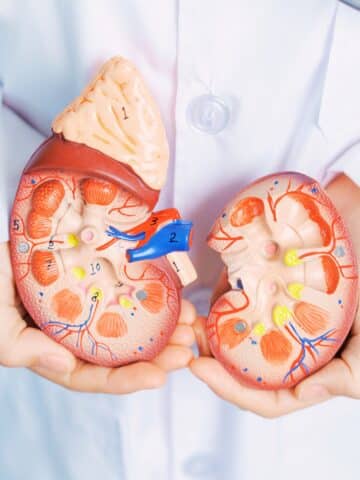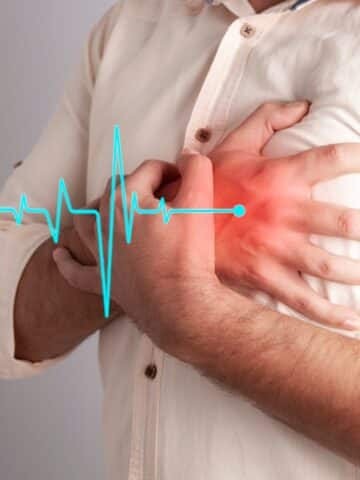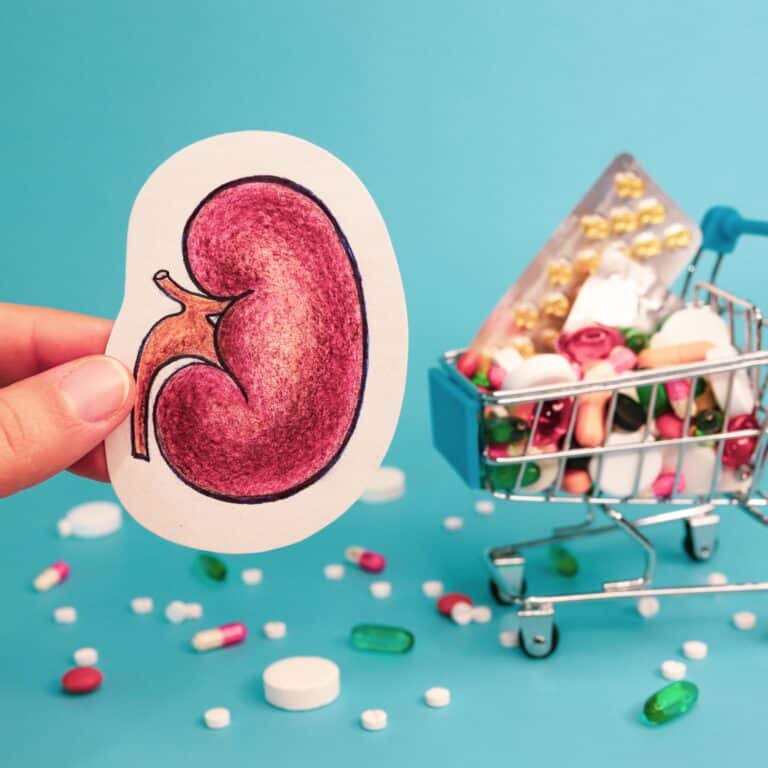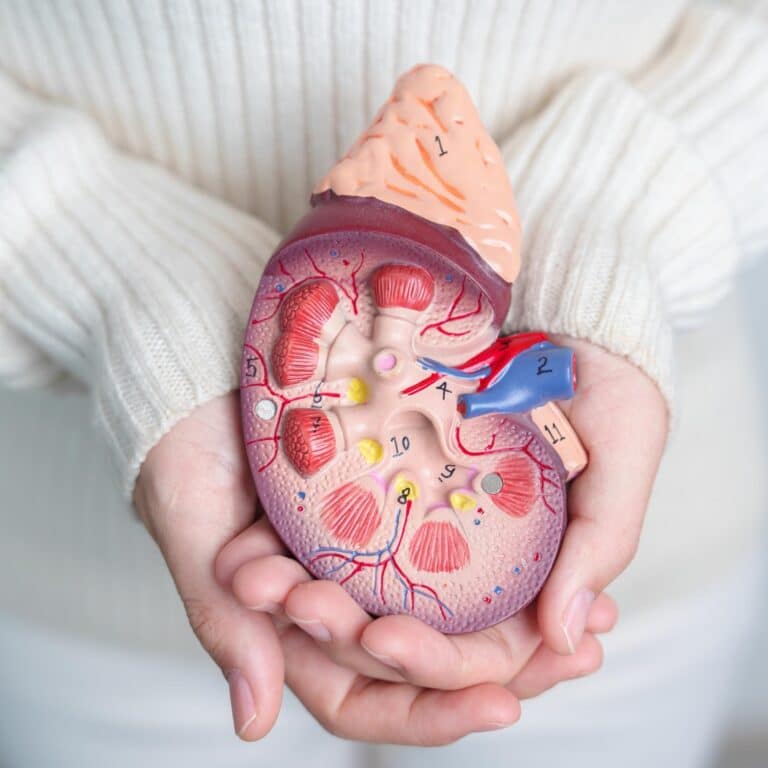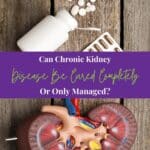Stages Of Chronic Kidney Disease
You're about to start learning about the complex world of chronic kidney disease. It's not easy, but understanding its stages could help you better support those dealing with this condition.
We'll break down each stage, explaining what's happening in the body and how it can be managed.
You'll also learn about treatment options like dialysis and transplant.
Get ready, we're diving deep into this crucial health topic to discuss loss of kidney function and end-stage kidney disease.

Jump to:
- Understanding Chronic Kidney Disease: An Overview
- Unpacking Stage One: Early Detection and Its Importance
- Progression to Stage Two: The Role of Lifestyle Changes
- Navigating Stage Three: The Onset of Symptoms and Medical Management
- Tackling Stage Four: Severe Symptoms and Necessary Interventions
- Stage 5 End Stage Renal Disease
- Dietary Adjustments Needed in Different Stages
- Role of Regular Monitoring in Managing Chronic Kidney Disease
- Connections Between Chronic Health Conditions and Renal Disease
- The Importance of Early Intervention in Kidney Disease
- Treatment Options: Dialysis and Kidney Transplant
- Frequently Asked Questions
- Understand Your Stage Of Chronic Kidney Disease
Key Takeaways
- Early detection is crucial in order to slow down or stop the progression of chronic kidney disease.
- Lifestyle changes, such as exercise and stress management, play a significant role in managing the disease.
- Medical management, including medication adherence and understanding potential side effects, is important in stage three of the disease.
- Severe symptoms in stage four require necessary interventions, and emotional coping and support are essential for patients and their families, during the loss of kidney function.
For More Recipes and Ideas --->> Get Your Free Meals and Recipes That Are Perfect for Pre-Dialysis Diets, Pre-Dialysis with Diabetes, or Dialysis Diets.
Understanding Chronic Kidney Disease: An Overview
Are you dealing with symptoms of kidney disease? Let's straight into understanding what chronic kidney disease is all about.
The history of kidney disease shows a condition where your kidneys, which are integral parts of your body based on the kidney anatomy, can't clean your blood as they should. Over time, this leads to waste build-up which could result in other health complications.
Now, you might wonder how it happens. Here's the thing,while some people have a genetic predisposition to it, others get it due to lifestyle choices and conditions like diabetes or high blood pressure. That's why disease prevention is vital, regular check-ups and maintaining a healthy lifestyle go a long way.
But let's not forget about the emotional impacts of this disease too. The diagnosis can be overwhelming and may cause feelings of confusion or fear. However, remember you're not alone in this journey.
Treatment options vary depending on the stage of the disease. You've got conventional treatments like dialysis or transplantation but don't overlook alternative therapies either which could offer relief from symptoms.
In essence, understanding chronic kidney disease isn't just about knowing its medical implications; it's also about recognizing its emotional aspects and exploring varied treatment paths. These tips can even help if you have a kidney stone or need a kidney biopsy.
If you have any questions about CKD, you can always check what the National Kidney Foundation has to say about the signs of kidney damage and the stages of kidney disease.
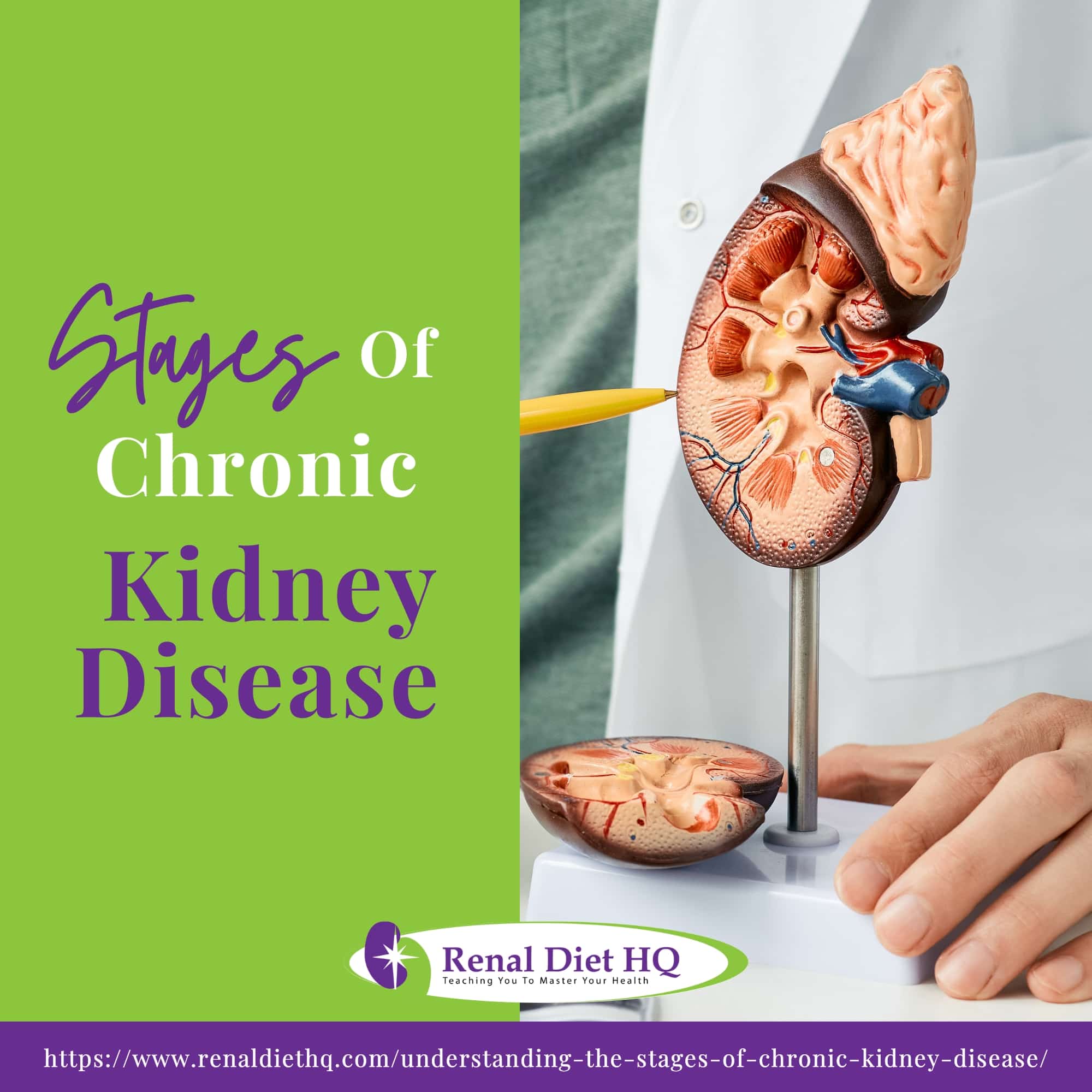
Unpacking Stage One: Early Detection and Its Importance
In the first phase, early detection is crucial because it can slow down or even stop the progression of the condition. As a caregiver or medical professional, you can encourage patients to undergo kidney function tests to assess their renal health. The purpose of these tests is to measure levels of certain substances in your patient's blood and urine.
Risk factors like high blood pressure, diabetes, and a genetic predisposition can increase vulnerability to chronic kidney disease (CKD). Educate your patients about these risks, awareness is a powerful preventive measure, so that you don't reach progression to kidney failure, without being properly informed with the risk of kidney disease. Feel free to get in touch with your healthcare provider about any potential complications that may arise!
Here's a table for quick reference:
| Risk Factors | Preventive Measures |
|---|---|
| High blood pressure | Regular check-ups & medication management |
| Diabetes | Maintain healthy diet & regular exercise |
| Genetic predisposition | Regular monitoring & lifestyle adjustments |
Patient education on preventive measures such as maintaining a balanced diet and regular exercise routine will help them manage their risk factors better. By identifying symptoms early, you're not just saving one life, but also creating an environment where everyone becomes proactive about their own health.
Let's make CKD less intimidating through information dissemination and empathetic healthcare practices.
Progression to Stage Two: The Role of Lifestyle Changes
You're now moving onto the next phase, where lifestyle changes play a pivotal role in slowing down the progression of the condition. Exercise benefits your kidney health immensely by reducing blood pressure and aiding glucose metabolism.
On the flip side, smoking impacts negatively on your kidneys. The harmful chemicals damage kidney function, accelerating disease progression.
Alcohol consumption too can be detrimental. It dehydrates you and adds extra burden to your kidneys. Cutting back on alcohol not only aids hydration, but also reduces stress on renal functions.
Speaking of stress management, it's crucial in controlling blood pressure, a significant risk factor for kidney disease. Engage in relaxation techniques like yoga or meditation for maintaining mental well-being.
Hydration is vital as well, remember that adequate water intake helps clear toxins from your body, easing the load off your kidneys.
In short, adopting healthier habits is not just beneficial but necessary when dealing with chronic kidney disease stage two. To serve yourself best and slow this condition's progression further, focus on exercise benefits, reduce smoking impact and alcohol consumption, while managing stress properly and understanding hydration importance.
Navigating Stage Three: The Onset of Symptoms and Medical Management
As you navigate through this third phase, it's crucial to pay attention to the onset of symptoms and take a proactive approach towards medical management. Recognizing symptoms early on can make a significant difference. Fatigue, fluid retention, or changes in urination can indicate worsening kidney function.
Effective treatment at this stage often involves medication adherence. It's key that you adhere strictly to your prescribed medications, which could involve:
- ACE inhibitors: These reduce blood pressure and protect kidney functions. Make sure to monitor for side effects like dry cough or high potassium levels.
- Diuretics: They help get rid of excess fluid and lower blood pressure. Watch out for potential dehydration.
- Erythropoiesis-stimulating agents (ESAs): They combat anemia by encouraging red blood cell production. Keep an eye out for any signs of excessive clotting. Emotional coping plays a vital role in managing chronic kidney disease. Connecting with others in similar situations, seeking mental health support, and practicing relaxation techniques can be beneficial.
Equally important is healthcare communication; openly discuss your concerns with your healthcare team. Patient advocacy promotes self-care, by equipping you with the knowledge to actively participate in decision-making about your treatment plan.
There are many markers of kidney damage and markers of kidney disease. It's important that you recognize an abnormal kidney structure when possible. A decrease in kidney function is a red flag to your body and there are many treatment decisions you'll need to make over the next few days, months, and years.
Tackling Stage Four: Severe Symptoms and Necessary Interventions
Tackling the fourth phase requires dealing with more severe symptoms and necessitates certain interventions. As kidney function significantly drops, you'll grapple with ailments like anemia, acidosis, and hypertension. Emotional coping becomes crucial at this stage, it's important to acknowledge any feelings of fear or anxiety and seek professional help if needed.
Medication adherence is paramount, missing doses or incorrect usage can exacerbate the disease progression. Your nephrologist will likely prescribe a cocktail of drugs to manage your symptoms, anti-hypertensives, erythropoiesis-stimulating agents, or phosphate binders might be part of your regimen. Understanding your medications' role aids in adherence as well as monitoring potential side-effects.
Patient education is vital here - knowing when to seek emergency care or recognizing worsening symptoms can save lives. Family support plays a significant role in ensuring consistent care and emotional wellbeing; they're often your first line of assistance during crises.
Exercise's importance can't be overstated, regular physical activity helps maintain healthy body weight, keeps blood pressure in check, reduces stress levels and boosts overall mood. However, don't overdo it, gentle exercises are beneficial without causing undue strain on your already taxed kidneys.
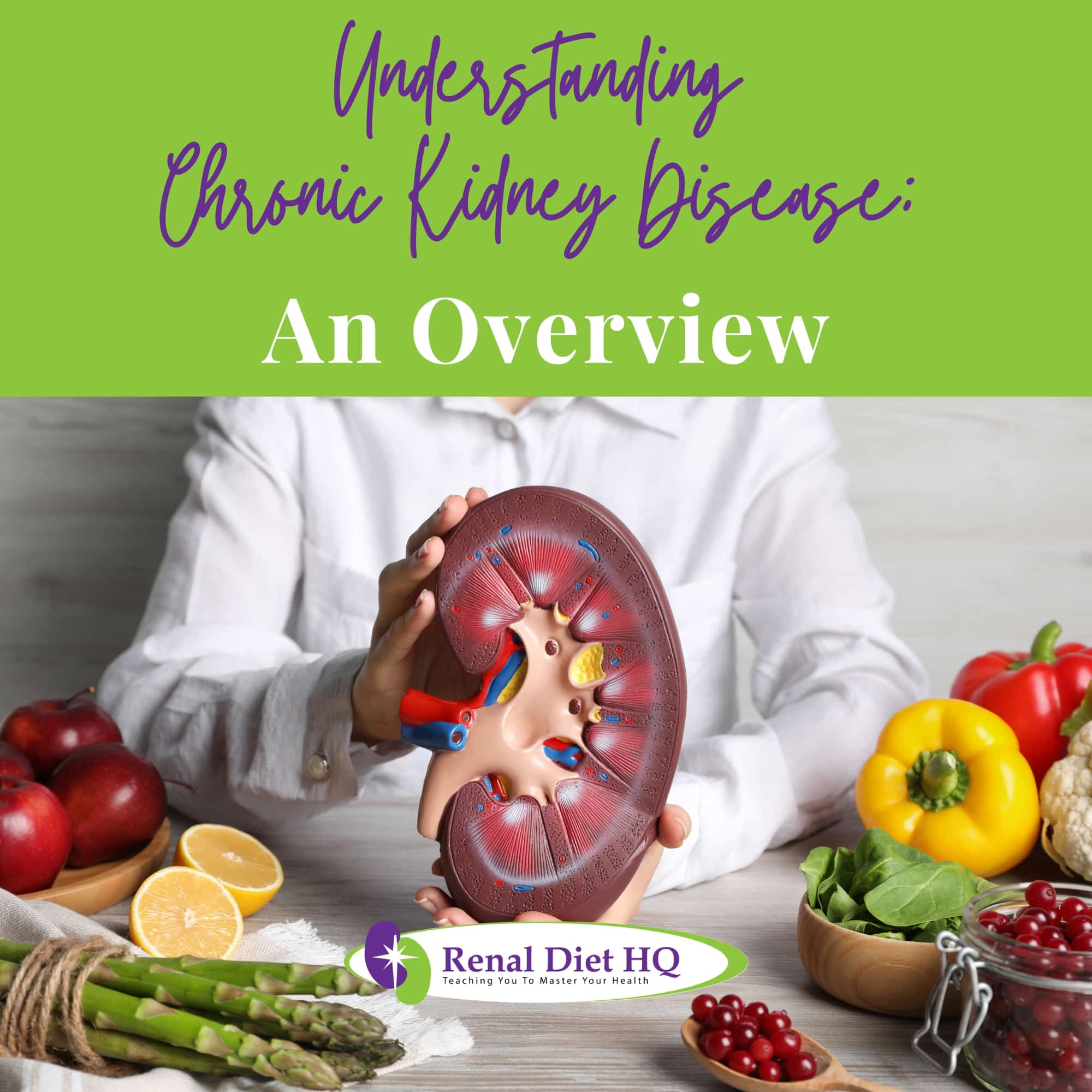
Stage 5 End Stage Renal Disease
Navigating the fifth phase, known as End Stage Renal Disease (ESRD), demands even more vigilance and aggressive intervention. By this stage, your kidneys have lost nearly all their ability to do their job effectively. You need a comprehensive understanding of your treatment options and an effective emotional coping strategy.
| Treatment Options | Emotional Coping |
|---|---|
| Dialysis | Therapy Sessions |
| Transplantation | Support Groups |
| Palliative Care | Meditation |
Dialysis or transplantation become vital for survival. However, transplant eligibility depends on various factors such as age and overall health status. For those ineligible for transplantation or waiting for a donor, dialysis helps keep the body's balance in check.
Emotional coping is equally important at this stage. Therapies can help you deal with the stress associated with ESRD while patient support groups provide a platform to share experiences and gain strength from others going through similar challenges.
Don't forget about financial implications of treatments too, it's crucial to explore insurance coverage and options available to manage costs.
Lastly, if treatments are no longer beneficial or wished-for, palliative care focuses on managing symptoms and improving your quality of life. This isn't giving up, it's choosing comfort over cure when that makes most sense for you.
Dietary Adjustments Needed in Different Stages
It's equally crucial to note the importance of dietary adjustments required throughout the different phases of this journey. As a caregiver or healthcare provider, you'll need to guide your patients in managing their diets as part of their chronic kidney disease (CKD) treatment plan.
You must emphasize phosphorus limitations, as excessive phosphorus can damage the kidneys further. Encourage foods low in phosphorus like fresh fruits and vegetables, rice and pasta while avoiding dairy products, nuts and seeds which are high in phosphorus.
Sodium control is another key area. Excessive sodium can lead to fluid retention and high blood pressure, these are two complications that could exacerbate CKD.
Protein Restriction might seem counterintuitive because protein is essential for body repair and growth but excess protein can strain the kidneys. Opt for plant-based proteins over animal proteins.
Fluid Management is necessary to prevent swelling, shortness of breath, and other complications linked with fluid overload in CKD patients.
Potassium regulation should be implemented because too much potassium can cause irregular heart rhythms dangerous for CKD sufferers.
Your understanding of these dietary adjustments will significantly enhance your patient's quality of life along this challenging journey.
Role of Regular Monitoring in Managing Chronic Kidney Disease
You've got to keep a close eye on your patient's health status by regular monitoring, as it plays a crucial role in managing their condition effectively. Monitoring frequency is key in early detection of any progression or complication related to chronic kidney disease (CKD). Patient education is also vital. Here's a simple guide that could be used:
| Monitoring Frequency | Diagnostic Tests | Treatment Adjustments |
|---|---|---|
| Quarterly review | Blood pressure checks, serum creatinine test | Medication dosages modified based on results |
| Bi-annual review | Glomerular filtration rate(GFR) estimation | Dietary changes recommended based on GFR results |
| Annual review | Comprehensive metabolic panel | Lifestyle modifications suggested |
Connections Between Chronic Health Conditions and Renal Disease
There's a significant link between long-term health conditions like hypertension and diabetes, and the development of renal disease. As a healthcare provider, it's crucial for you to understand these connections to aid in comorbidity management.
- Diabetes Correlation: Diabetes damages small blood vessels throughout the body. When these vessels in the kidneys are damaged, they can't filter out toxins efficiently, leading to kidney disease.
- Hypertension Impact: Uncontrolled high blood pressure forces your kidneys to work overtime. This extra strain can lead to kidney failure over time.
- Heart Disease Link & Obesity's Influence: Both heart diseases and obesity increase the risk of developing kidney diseases, due to increased workload on the kidneys and damage to kidney tissues.
By managing these chronic conditions effectively, you're able not only to slow down their progression but also reduce the risk of renal disease development in patients with these conditions.
It's also important to educate patients about lifestyle modifications, such as healthy eating habits and regular exercise that can help manage their conditions better.
Remember, prevention is just as important as treatment when it comes to maintaining long-term health outcomes for your patients!
The Importance of Early Intervention in Kidney Disease
Transitioning from understanding the link between chronic health conditions and kidney disease (can kidney disease be reversed?), let's look into the crucial role of early intervention in maintaining kidney health.
You see, early diagnosis benefits are manifold. It can slow down disease progression, prevent severe complications, and improve your quality of life. You'll be able to take preventive measures, like dietary modifications and medication management at an earlier stage.
Here's a snapshot of how early diagnosis impacts treatment outcomes:
| Early Diagnosis Benefits | Late Diagnosis Consequences |
|---|---|
| Slows down disease progression | Rapid deterioration of kidney function |
| Prevents severe complications | High risk for serious health issues |
| Improves quality of life | Compromised lifestyle due to illness |
Genetic predisposition studies have also gained traction in recent years. These studies help identify those at risk even before symptoms manifest, allowing for proactive prevention strategies.
Community outreach initiatives are key drivers in promoting kidney health awareness. They encourage regular screenings and educate about lifestyle changes that support renal health.
What else comes with poor kidney function?
- Irreversible damage to moderate damage
- Kidney replacement therapy
- Antihypertensive medications
- Sometimes tubulointerstitial disease, glomerular diseases, Ischemic Nephropathy, and even renal function decline.
Treatment Options: Dialysis and Kidney Transplant
Let's explore your treatment options, if your condition has progressed beyond early intervention, specifically dialysis and kidney transplant.
When kidneys can't function adequately on their own, dialysis stands as a feasible solution. There are two types: hemodialysis, where blood is filtered out of your body and cleaned before being returned; peritoneal dialysis involves cleaning the blood within your body using a special fluid.
However, dialysis isn't without complications. Long-term use may lead to anemia or weakened bones due to changes in mineral metabolism. Therefore, it's imperative to monitor for these and promptly address any issues that arise.
On the other hand, you might be eligible for a kidney transplant depending on factors such as age, overall health status, and compatibility with potential donors. Ideally, living donors present a higher success rate because of better genetic matching.
Post-transplant care is crucial too. It entails strict adherence to medications that prevent organ rejection and regular check-ups to ensure the new kidney functions properly.
While both treatments have their challenges, understanding them empowers you in making informed decisions about your healthcare journey.
Frequently Asked Questions
Living with chronic kidney disease can have significant psychological effects. You might experience emotional stress and struggle with disease acceptance.
It's common to face challenges in coping with your condition, which can impact not only your mental health but also the wellbeing of your family. Remember, it's okay to seek help and support as you navigate this journey.
Taking care of your mental health is just as important as managing the physical aspects of your disease.
Chronic kidney disease can seriously impact your fertility and pregnancy. Your kidney health plays a vital role in hormonal balance, which affects fertility.
Pregnancy complications may rise due to high blood pressure or proteinuria caused by your condition. If you're on dialysis, the impact is even greater, making conception tough and pregnancies riskier.
However, with careful management and medical guidance, it's still possible for you to have a successful pregnancy.
Chronic kidney disease can't be completely cured, but it can be managed. Disease prevention is crucial, early detection helps slow its progression.
Kidney transplants are an option if your condition worsens. Alternative treatments, like diet changes and exercise, impact positively on your health too. Whether you're focused on a cardiovascular disease, loss of appetite, or even blood pressure medication, chronic kidney disease can be managed.
It's about managing symptoms and enhancing your quality of life. Remember, every person's journey with this disease is different, continuous medical guidance tailors the best approach for you.
Life expectancy with chronic kidney disease varies greatly. You will hear people talk about mild damage and renal failure. It's influenced by factors like age, overall health, and how well you manage your symptoms.
Diagnostic methods help track the disease progression. Dietary changes can slow this down significantly.
Knowing and controlling risk factors is also crucial for longer survival. Remember, a diagnosis isn't a death sentence, it's an opportunity to take control of your health through informed decisions and proactive symptom management.
If you have any specific questions about the history of kidney failure or kidney damage, then make sure you speak to a kidney doctor! Mild kidney damage is a real thing, so you'll want to make sure your blood sugar levels are being monitored as closely as possible.
Understand Your Stage Of Chronic Kidney Disease
So, you've learned about the stages of chronic kidney disease and the vital role early detection plays. It's clear that lifestyle changes can slow progression and medical management is key in later stages.
Regular monitoring helps manage this condition, as does understanding how other health issues may impact your kidneys. Early intervention is crucial, with treatments like dialysis or transplant available. if needed.
Remember knowledge is power, stay informed to protect your kidney health. You'll want to make sure you're monitoring for complications, while on a kidney-friendly diet.


